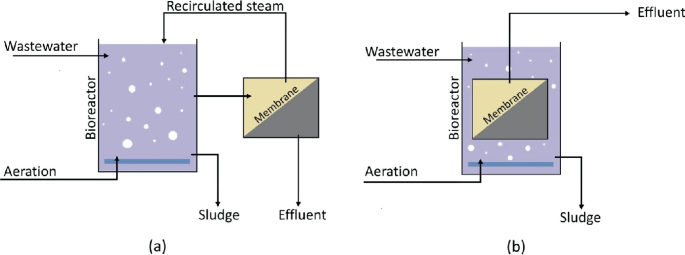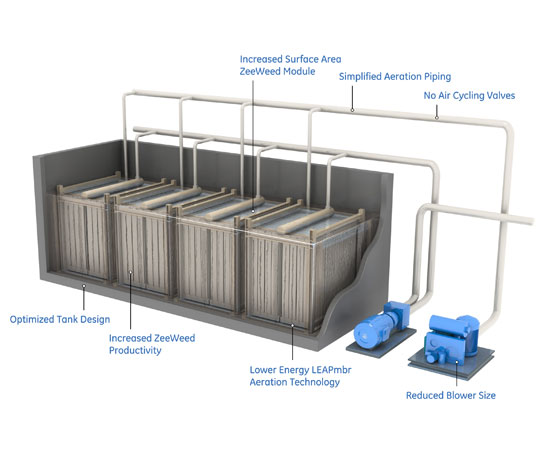How Membrane Bioreactors Are Changing Water Filtration Systems
The introduction of membrane bioreactors (MBRs) represents a substantial development in the field of water filtration, merging organic therapy procedures with advanced membrane layer filtration innovations. This integration not only enhances the quality of treated effluent however likewise addresses metropolitan space constraints, making MBRs specifically appropriate for densely inhabited areas. As international water shortage intensifies, the role of MBRs in promoting safe and clean water reuse and lasting water monitoring comes to be progressively vital. The effects of this innovation extend past efficiency-- what difficulties and chances lie in advance for its extensive execution?
Summary of Membrane Layer Bioreactors
Membrane layer bioreactors (MBRs) represent a significant advancement in water filtration technology, as they integrate organic treatment procedures with membrane filtering. This combination enhances the effectiveness of wastewater treatment by utilizing bacteria to break down organic toxins while all at once utilizing semi-permeable membranes to separate cured water from put on hold microorganisms and solids.
The MBR system usually includes an organic reactor where the microbial population metabolizes impurities, followed by a membrane filtration system that retains biomass and permits only tidy water to go through. This double capability results in higher effluent top quality compared to standard treatment methods. MBRs can be operated in both set and continual flow modes, supplying versatility in design and application.
They likewise allow the recovery of water for reuse, therefore adding to water sustainability efforts. Overall, MBRs are at the leading edge of boosting water therapy performance and quality, showcasing the possibility for innovative remedies in environmental administration.
Benefits of MBR Modern Technology
The assimilation of organic therapy with membrane filtering provides various advantages for water purification procedures. One of the key advantages of Membrane layer Bioreactor (MBR) technology is its ability to properly eliminate both inorganic and organic impurities, leading to top notch effluent. The membranes work as a physical obstacle, preventing put on hold solids and microorganisms from passing through, which boosts the total security and dependability of cured water.
Furthermore, MBR systems need a smaller impact compared to standard therapy methods, enabling for a lot more effective space application. This portable design is especially helpful in urban setups where land is restricted. MBRs likewise demonstrate functional adaptability, suiting varying influent top qualities and flow prices without substantial efficiency degradation.
In addition, the procedure uses enhanced nutrient elimination abilities, especially for nitrogen and phosphorus, which are vital for preventing eutrophication in obtaining waters. The minimized sludge manufacturing related to MBR technology likewise converts to lower disposal prices, making it a cost-efficient remedy in the lengthy run - Membrane Bioreactor. On the whole, the advantages of MBR modern technology placement it as a leading option for cutting-edge and lasting water filtration systems, attending to both environmental and financial concerns
Applications in Water Purification
Applications of Membrane Layer Bioreactor (MBR) innovation in water filtration are impactful and diverse, attending to various treatment requires throughout several industries. MBRs effectively combine biological treatment processes with membrane filtration, making them perfect for community wastewater therapy, industrial effluent management, and also drinkable water reuse efforts.
In community settings, MBRs are increasingly used to boost the top quality of treated wastewater, enabling conformity with stringent discharge regulations and assisting in the recycling of water for watering and non-potable uses. Their portable layout also makes them suitable for metropolitan environments where room is restricted.
Industrially, MBR technology is utilized to deal with process water and wastewater, particularly in fields such as food and beverage, pharmaceuticals, and fabrics. By successfully eliminating pollutants and suspended solids, MBRs assist industries decrease environmental effects while recuperating useful sources from wastewater streams.
In Addition, MBRs are getting traction in decentralized water treatment applications, where small-scale systems can be deployed in remote locations or creating regions. This adaptability enables neighborhoods to achieve sustainable water administration solutions, boosting accessibility to clean water while decreasing reliance on typical therapy techniques.
Study and Success Stories

In one more instance, a fabric production facility in Bangladesh took on MBR modern technology to address its wastewater difficulties. The system decreased chemical oxygen need (COD) degrees from 1,200 mg/L to less than 100 mg/L, thus meeting governing requirements and substantially lessening ecological effect.
The University of Cape Town's MBR setup has shown reliable in dealing with greywater for non-potable reuse on school. This job not only conserves safe and clean water but also works as an academic model for sustainable techniques.
In addition, a fish and shellfish processing plant in Norway made use of MBR technology to treat effluents having high levels of raw material, attaining over 90% pollutant removal. These study underscore MBR innovation's convenience and its vital function in boosting water top quality across diverse applications.
Future of Water Treatment Solutions
As international water scarcity and contamination difficulties escalate, innovative water treatment options are coming to be you can look here significantly vital to make sure lasting accessibility to tidy water. The future of water therapy exists in the assimilation of advanced technologies that enhance the effectiveness and efficiency of purification processes. Membrane bioreactors (MBRs) are at the leading edge of this development, integrating biological treatment with membrane filtration to produce premium effluent appropriate for different applications.

Arising fads such as source healing from wastewater, including nutrients and power, will certainly better change treatment facilities right into environment-friendly centers. Developments in nanotechnology and membrane layer products assure improved efficiency and longevity of filtering click for more systems.

Verdict
In final thought, membrane bioreactors stand for a significant innovation in water purification technologies, effectively combining organic treatment with innovative membrane purification. The various benefits, including enhanced effluent quality and minimized spatial requirements, make MBRs especially ideal for metropolitan applications. Their duty in potable water reuse and lasting water management highlights their value in attending to global water shortage obstacles. Continued r & d will additionally enhance the effectiveness and fostering of MBR modern technology, guaranteeing a resistant future for water treatment services.
The appearance of membrane layer bioreactors (MBRs) stands for a significant advancement in the field of water purification, merging biological treatment processes with advanced membrane filtration technologies. As global water scarcity heightens, the function of my site MBRs in promoting drinkable water reuse and lasting water administration ends up being progressively vital. They likewise allow the recovery of water for reuse, thus contributing to water sustainability campaigns.As international water deficiency and contamination difficulties heighten, ingenious water treatment solutions are coming to be significantly necessary to guarantee sustainable access to tidy water. Their function in potable water reuse and sustainable water monitoring highlights their value in dealing with global water deficiency difficulties.